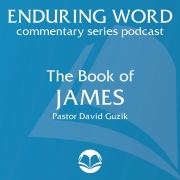A Most Unpopular Preacher Passage
/3 Comments/in For Pastors, Preachers, Bible Teachers/by David GuzikMy brethren, let not many of you become teachers, knowing that we shall receive a stricter judgment. For we all stumble in many things. If anyone does not stumble in word, he is a perfect man, able also to bridle the whole body. (James 3:1-2)
Many of us Bible preachers and teachers have a favorite passage to speak upon. James 3:1-2 might be the most unpopular passage of many preachers and teachers.
It tells us that Bible preachers and teachers will receive a stricter judgment. We will be judged on a higher, stricter standard. James knew that he was included in that stricter judgment; he wrote, “we shall receive a stricter judgment.”

This shouldn’t make us despair, but it should make us serious about our work. It should especially make us serious about our words, because James then immediately added “If anyone does not stumble in word, he is a perfect man, able also to bridle the whole body.”
There is a lot that could be said about that statement, but let’s just think about this: if I am a Bible preacher or teacher, I regard my words as an instrument of God’s work in this world. Therefore, I should take care with my words, and not only when I am preaching. We who proclaim God’s word have a special responsibility to speak in a way that gives God glory.
Let’s rely on God for the desire and the strength to not stumble in word, to grow in this area of godliness. It’s easy for us as preachers and teachers to sin with our words.
– We stumble in word about ourselves, with our boasting, exaggeration, and selective reporting.
– We stumble in word about others, with our criticism, gossip, slander, cruelty, two-facedness, and anger; or with flattery and insincere words meant to gain favor.
– We stumble in word with impure or profane speech, speaking with a vocabulary that shows very little holiness.
Here’s a prayer: “Lord, for Jesus’ sake, forgive me for the times when I stumble in word. Give me a desire for greater wisdom and holiness in what I say when I’m preaching and when I’m not, and the strength to grow in this area.”
That might help us to do better with a stricter judgment!
Blessings to You in Jesus’ Name – David Guzik
Click Here to Receive Email from David for Pastors, Preachers, and Bible Teachers
How to Fight God and Win
/0 Comments/in Weekly Devotional/by David GuzikHe took his brother by the heel in the womb, and in his strength he struggled with God. Yes, he struggled with the Angel and prevailed; he wept, and sought favor from Him. He found Him in Bethel, and there He spoke to us. (Hosea 12:3-4)
Through the Prophet Hosea, God spoke to Israel by an ancient name – Jacob. Jacob was famous because at his birth, he took his brother by the heel in the womb. He literally came out of the womb with his hand on his brother’s heel (Genesis 25:26).
As God looked back at the patriarch Jacob, He saw that Israel in Hosea’s time was just like their forefather Jacob in the days of Genesis. In ancient Israel, a “heel-catcher” was a double-dealer, someone who achieved their goals through crafty and dishonest ways. Through Hosea, God said, “That was Jacob then and it is Israel now.”

Then, the prophet did a fast-forward and looked at another event in the life of Jacob, when in his strength he struggled with God. The prophet recalled the struggle between Jacob and the Man of Genesis 32:24-30. Jacob refused to submit to God, so God demanded submission from him in a literal wrestling match.
In Genesis 32, Jacob had one of the most fantastic athletic contests of all time – a wrestling match with God. We may speak spiritually of wrestling with God in prayer, or wrestling in spiritual warfare, but Jacob’s wrestling was physical and spiritual. He was locked in competition with God in human form.
Hosea’s words he struggled with God reinforce a point already made clear in Genesis 32:24-30: Jacob wrestled with God in human form. Since this was a unique messenger from heaven, He is also appropriately described as an Angel of the Lord.
Inspired by the Holy Spirit, Hosea emphasized two more details from the Genesis 32:24-30 account: Jacob prevailed, and he wept. Jacob prevailed in the only way anyone can when they struggle against God: he lost, he accepted it, and he surrendered to God.
How do you wrestle with God? There are many ways we can resist Him. Our resistance may not be physical, but it is still real. When you struggle against God, the only way to win is by losing.
Notice also that Jacob wept. This was how desperate and broken he was as he hung on to God, begging for a blessing. Jacob lost the athletic contest, but he won spiritually. He clung to God until blessing was promised.
Losing when you struggle against God is a good thing. It is good to remember that He is the Creator and I am the creature. He is the King and I am a subject. He is God and I am not. He has won me over. You can win when you fight God by letting Him win you over.
How to Translate the Bible
/6 Comments/in Weekly Devotional/by David GuzikYou yourselves are our letter, written on our hearts, known and read by everybody. You show that you are a letter from Christ, the result of our ministry, written not with ink but with the Spirit of the living God, not on tablets of stone but on tablets of human hearts. (2 Corinthians 3:2-3)
The first Bible of my own was a paper-back version given to me when I came forward at an altar call to give my life to Jesus Christ. It was just a New Testament, The Living Bible version, and on the front, it had a picture of a child on his father’s shoulders and said, “The Greatest of these is Love.”

I have many more translations of the Bible now, and it seems like there is a never-ending stream of new Bible translations. No matter what Bible you like to read, the principle of 2 Corinthians 3 is still true: The Bible everybody reads is your life.
You yourselves are our letter, Paul wrote. Every letter has an author, and we are a letter from Christ. Every letter has readers, and we are known and read by everybody. Our life is like a letter, and we can’t hide it. People you meet every day read the letter of your life. We can’t blame them for doing this, because if the work of Jesus is real, it will be real in our lives.
Because every Christian is a bible, perhaps it’s time to recognize some new translations:
The “Ashamed to Follow Jesus” version (AFJ)
The “Sin Doesn’t Apply to Me” version (SDAM)
The “Other Christians are Terrible” version (OCT)
The “Christian Life is Miserable” version (CLM)
The “Holier than Thou” version (HTT)
How do we get the right kind of letter written? Again, look at 2 Corinthians 3:3. Every letter is written with a pen, and Paul says the letter of their Christian life is the result of our ministry. This means we should never neglect what other Christians can do in our life. Isolating ourselves as Christians is a bad thing to do.
Every letter is written with ink, and Paul says we are written not with ink but with the Spirit of the living God. Have you yielded your life to the Spirit of God? Are you walking in stress, or walking in the Spirit? If you are “translating” the Bible poorly, perhaps it’s because you are walking in stress, and not the Spirit.
Every letter is written on something, and our “bible” is written not on tablets of stone but on tablets of human hearts. This means we have to let God write His Word on our heart.
It’s sad to think that perhaps we haven’t translated the Bible very well into our lives. When we provide a poor translation, other people read it and get the wrong idea about Jesus. If you aren’t a follower of Jesus Christ, I’m sorry for the bad “letters” you’ve read. But I do ask you to remember that ultimately, it’s all about Jesus Christ. Instead of criticizing – sometimes with good reason – the “translations” around you, why not let Jesus write into your life?





